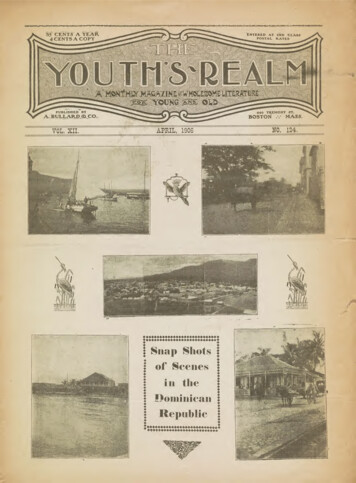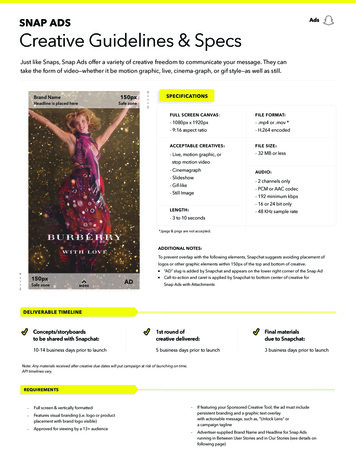
Transcription
35 CENTS A YEAR4 CENTS A COPYENTERED AT 2ND CLASSPOSTAL RATES' XS& PUBLISHED BY444 TI EMONT ST.A. BULLARD . CO.BOSTON .v MASSVOL. XII.f Snap Shots fsof Scenesj4in the I XX444DominicanRepublic4'4 444444444444444444444444
CHE German children wake onEaster Monday in about thesame state of mind in whichAmerican children wake onChristmas morning. Instead of withSanta Claus and reindeer their dreamshave been filled with kind hearted rab bits and their attendants, elves, fairiesand little old fashioned gnomes, wholive- in deep holes in the mountainsides and who keep careful account ofthe-behavior of each child during theentire year. All night long, accordingto their belief, this company has beenbusy coloring and hiding eggs aroundthe house, in out of the way nooks andcorners.The first child to awaken at oncearouses the others to join in the “eiersuchen,” for no one is allowed to beginthe search until all the brothers andsisters are dressed and ready. Thenat a signal from “vater” away theystart, and the halls and rooms resoundwith merry shouts as the nests of col ored eggs are discovered and captured.The stores are brought together anddivided equally among them.The breakfast consists almost entire ly of eggs, and when the meal is overthe boys and girls go off to the streetto join their playmates. The game of“eier stoszen” is inaugurated at once.Each child has been provided withfrom five to six hard boiled eggs, andthey butt the ends together with asudden rap. If one egg cracks, theowner turns it over to the child whohas done the damage; if both eggsbreak, neither loses.The building of bonfires also consti tutes a portion of the morning fun.These fires are made only for the pur pose of heating pitch or tar, whicheach boy has been collecting and stor ing for weeks. Then they turn theirjackets inside out and separate intogangs, each gang to have its own bon fire and to war against the other. Thepitch is melted on the ends of longsticks and serves as the weapon ofolder folks, and some of the boys areso clever that they will return frombattle, peace having been declared,with not as much as a single daub ontheir coats or faces.Others not sowell versed in the art of parrying thestrokes will emerge besmeared fromhead to foot.After the midday meal the children,from the youngest to the eldest, arewashed and dressed in their bestclothes. If the “grossmutter und grossvater” live in the house with them theyremain indoors, but if not they go tothe home of their elders. They are re ceived very formally by the grand parents, and as each child steps for ward he is questioned as to his healthRnd general conduct, and after beingadmonished to continue an obedientchild or praised for some kind act hereceives a present.In the evening comes the egg party,and where the grandparents have alarge house the event takes place un der their roof. The games which makeup the fun of the evening take theform of contests in which all of thechildren are allowed to participate.Perhaps the most exciting sport ofthe evening is the “eier laufen,” or eggrace. A course is built around theroom which takes the child over chairsand boxes and under tables and finallythrough a big barrel or box and endson the opposite side of the apartment.Six eggs are placed on the floor at thestarting point, and the child is given ashallow wooden spoon. With this hemust take each egg and, carrying itaround the course, deposit it in a bas ket at the finish. lie who completesthe transfer in the shortest time is de clared the winner. If the egg is drop ped on the course it may be picked upagain, but a point is marked againstflie contestant every time the egg fallsto the floor. The sport will keep everyone present in roars of laughter untilthe last contestant has traversed thecourse.At the supper table each child findsa fancy candy egg at his place, andwhen the feast is over it is takenhome to dream again over the eventsof the happiest day of the year.—Bos ton Globe.M lentenSacrifice and ItsConsequencesSKIND HEAETED GNOMES HIDING THE EGGS.warfare. Each lad will pick out anopponent and endeavor to smear thepitch over him without getting anyfrom his antagonist. This sport fur nishes. considerable amusement to theHE stands before her mirror,daintily turning her head fromside to side, trying the effect ofher new Easter bonnet.Herhair is coiled a little too low for thenew shape, and, as it is long beforechurch time, she pulls it down and pro ceeds to rearrange it. The average wo man usually falls to thinking whilefixing her hair, and she is only anaverage woman with the average hu man experience, so as she slowly twistsand pins the long hair before sheknows it her thoughts have slippedback over several years.Almost unwillingly she thinks of an other Easter, when those streaks ofgray were not seen in the brown, glos sy coil and when the delicate, refinedface which the mirror gives back wasfresh and rosy and young. As she loopsup a braid and turns musing to catchthe effect she is living over again theAsh Wednesday preceding that faroffEaster when she had done the foolishthing which was to mean so much forher in after years.It hack all come upon her so suddenly,She and her friend Jeannette had beentalking of observing Lent that year,“What do you think of the latest?”“What is the latest?”"Why, of course you know—-Jeaniette’s engagement to Bob Adams.Teannette told me last night. Are yougoing my way?”*******The last pin is in place. The newbonnet, satisfactorily adjusted, is verybecoming to the sweet face under it,which at present looks a little paleand worn. She is a little tired nowand sits down to rest while she drawson her gloves. She resolutely tries tobring her thoughts back to the present,and each had determined to give up forthat season the thing that she most de lighted in. Then Jeannette had saidlaughingly:“You’ll not give up the one thing youcare for most of all even for a shortforty days. You would not forego thepleasure of being with Bob Adams, andthat’s your dearest possession, I know.”She remembers now how indignant ly she had denied that she cared forBob more than for any other youngman, and when her friend banteringlyrepeated, “All the same, you won’tcut him for the next forty days,” shehad impulsively taken up the chal lenge and had treated him with stud ied coldness or had shunned him per sistently for the following five or sixweeks.*******It tires one so to keep the armstretched above the head, so she letsher hair drop for awhile and leans herforehead against the cool surface ofthe mirror. She is thinking of the mis erable days that followed that hastyresolve—how her own suffering hadrevealed to her how very much shehad loved Bob—dear old Bob, who hadseemed at first so grieved and per plexed by her altered behavior, butafter awhile had treated her with acoolness to match her own. She didnot sec much of Jeannette during thoseweeks, and everything had seemedvery dull and stupid. How she hadcounted the days to Easter!Pridemade her keep her promise, but sheintended to make it up with Bob onEaster merniug.The first church bells are ringingnow, but she does not seem to hearthem.How daintily she had dressed her self on thnt wished for morning, andwith what a glad heart had she walkedup the aisle to her pew, which was justin front of the Adamses’, in which shesaw Bob already seated. The music,the flowers, the sunshine, all comeback to her now, but then they wereill merged into one sensation of hap piness, asd it was voiced in thethought, “I’ll speak to Bob after churchand make it up.”The long service at last over, shehad turned in her pew to greet Bob;but, to her surprise, he had gone outalready. As she passed down the aisleshe had slipped her hand in Daisy Mar shall’s, and Daisy had given her aloving little squeeze, whispering:but they slip from her and fasten onstill another Easter morning.Lent had come very early that year,and Easter morning had been too bleakfor her to venture out. Her husbandhad gone to church alone.They were staying in the old homethen to be with mother, who clung toher so. On that morning she was readlug to her mother when a card wasbrought up to her, and on it the nameof “Mr. Robert Adams.”Jeannette and Bob had lived abroadsince their marriage, traveling fromplace to place, and the card was thefirst intlmatioh of their return.How well she remembers how hand some Bob looked as he came forwardto greet her when she entered the room.She feels agaih the awful leap of herheart as she met the glad, warm lookin his eyes. All she could say was,“How is Jeannette?”“Jeannette died in Rome,” he an swered gravely. “She bade me givethis letter to you, and to give it onEaster Sunday morning. I arrived lastnight and had hoped to meet you firstin church this morning. Missing youthere, I came on to the old home.”She took the letter from him andopened it slojvly. She remembers every word of tliat brief message:Dear Bessie—I did it all. I made youtake that foolish resolve.I made Bobthink that you did not care for him. Icould not help it, for I loved him. I havebeen bitterly punished, for he has neverceased to love you. I have told him all.-Lent is over; make him happy this Eastermorning-. Your repentantJEANNETTE.She remembers how the very lifeseemed to go out of her as she non chalantly put the letter back in its en velope, handed it to him and said:“Let us think that I have never re ceived this letter. I have been GarrettLeighton's wife for two years.”Then he had turned and left her.The awful hour that followed—will thepain of it never leave her? When aheart breaks how can it continue tohold so much? Bob is dead now. Shewill be dead, too, some day, and nowshe has her home and her boy, and yet—and yet— No one can hear the bittersobbing, it is so low and stifled.A few minutes later the GarrettLeightons w-alk quietly to their pewin the flower bedecked, beautiful oldchurch. The little milliner in the gal lery nudges her friend and says;“That’s my work on Mrs. Leighton’shead. Ain’t they a handsome couple?And just as happy as they can be. Youought to see them in their lovely home.Some folks do seem to have everythingin this world.”—Philadelphia Times.Easter In the Emerald Isle.In no place outside of Rome is Eas ter celebrated more joyously and uni versally than it is in Ireland.Thewhole heart of the Irish people, peas antry and gentry alike, goes out inglad and pious rejoicing at the thoughtof the Saviour of mankind risen fromthe dead. Thh celebration of the daymay be said to begin on the eveningbefore. That evening is known in Ire land as “Holy Saturday.” The longperiod of restraint imposed by Lenthas nearly parsed, and the long pentup. mirth and merriment will bubble
over in spite of everything. All thehousehold sits up to ‘‘watch the Lentout.” A hearty meal is prepared, andat midnight justice is done to it.—NewYork Times.Tlie Need of an Easter Greeting.In Roman Catholic countries the me diaeval “Christ is risen,’’ “He is risenindeed,” still prevails, but not in Amer ica, and it is doubtful if such a greet ing, however significant in spirit, wouldfind thorough acceptance here. Withthe growing recognition of the festival,its celebration by all sects and classes,as is now the case, the want of a ver bal expression symbolizing in somepart all that Easter day means isstrongly felt. There should be an Eas ter greeting just as there is a Christmasand New Year’s greeting, and it shouldbe welcome to all creeds. The oppor tunity is lying in wait for some felici tous phrasemaker.—New York Sun.When Evil Hides Its Face.The peasantry of Sweden believethat Easter eve is an occasion uponwhich supernatural influences prevailto a great extent, that all devils andwitches are then abroad and that thefairies hold high carnival.All thischanges with the dawn of Easter morn ing, for then no evil spirit dares stirabroad,All things evil know thatChrist, who triumphed over death andthe grave, has risen in glory to curtailtheir power and ultimately destroythem.It is a Swedish superstitionthat all horses and mules fall on theirknees on Easter morning.completely filled with eighty-two cop per air tanks shaped to conform to thespaces they occupy and removablethrough hatches in the deck. These airchambers possess sufficient buoyancyto render the boat unsubmergible. Inaddition there are two air chambers,one at the bow and one at the stern,which are capable alone of supportingthe craft, though they are intendedprincipally to aid the boat in rightingitself when capsized. Longitudinal airchambers are provided under the sidethwarts, and these direct the watercoming inboard to the amidships emp tying tubes. The combined buoyancyof the air cases is between eleven andtwelve tons, and it was necessary toplace a load of forty-four men of av erage weight aboard to bring the deckscuppers awash.The boat automatically frees itselffrom water taken aboard, through aseries of ten six-inch copper tubes, fiveon each side of the deck. As the latteris above the water line, the water ship ped over the rails or when the boat ison her beam ends will escape throughthe tubes within a few seconds. ’Thesetubes are, of course, provided with au tomatic valves properly balanced topermit the flow in one direction and toshut off communication from the other.In case of an upset the boat rights it self almost instantly, and in the testscarried out by the government it wasfound that it could be held in an in verted position only with considerabledifficulty.§teamfitter»’ Cement.GASOLINE LIFEBOATS,tateat Design ofCraft Used by theLife Saving Serviee.Herewith is shown the latest designof the lifeboats constructed for theUnited States life saving service. Thisis of the self righting, self bailing, nonsinkable type, of which the govern ment has in service some fifty exam ples. At the present those in use are,with one or two exceptions, handled bymeans of sails and oars, but in the lat est design auxiliary power has been in stalled in the form of a twenty h
Dominican Republic '4 444444444444444444444444 f . C HE German children wake on Easter whichMonday in about the same andstate of mind in which American children wake on Christmas morning. Instead of with Santa Claus and reindeer their dreams have been filled with kind hearted rab bits and their attendants, elves, fairies and little old fashioned gnomes, who live- in deep holes in the .











